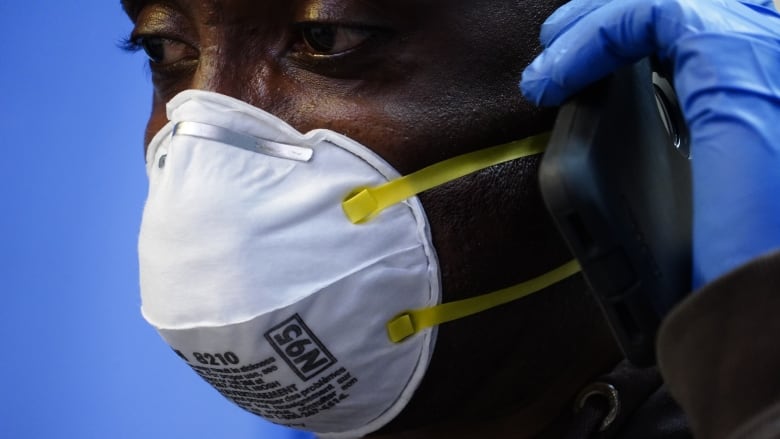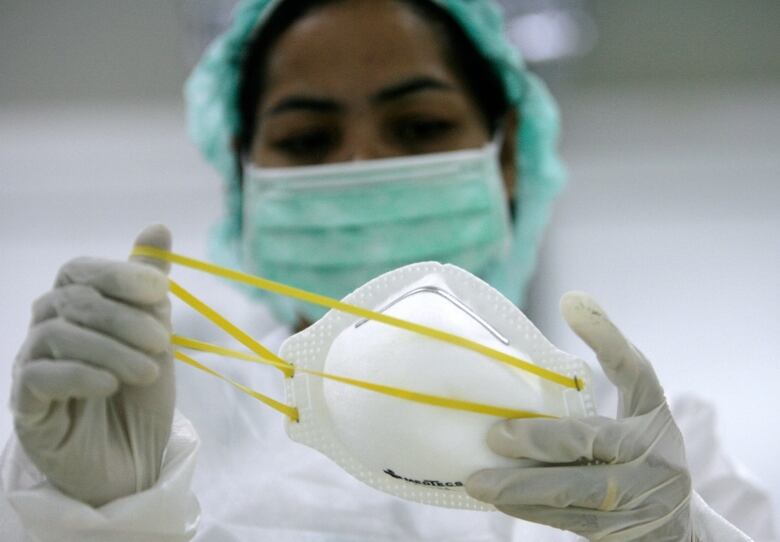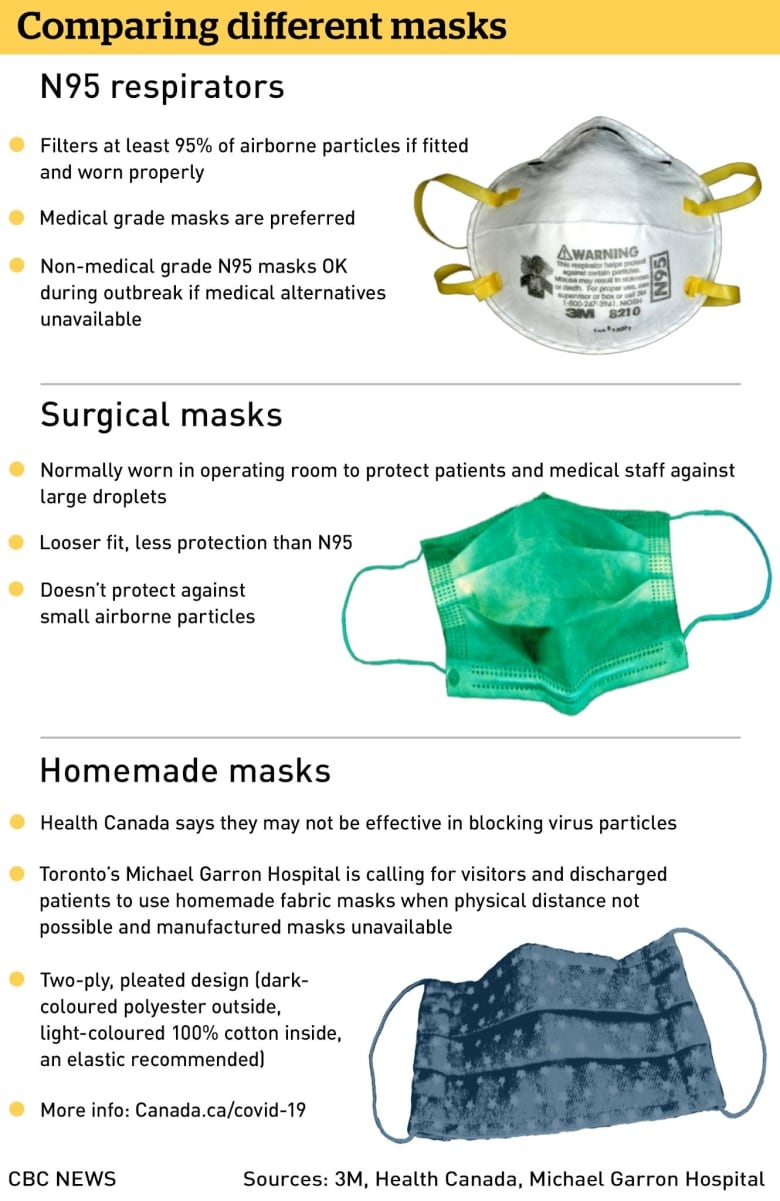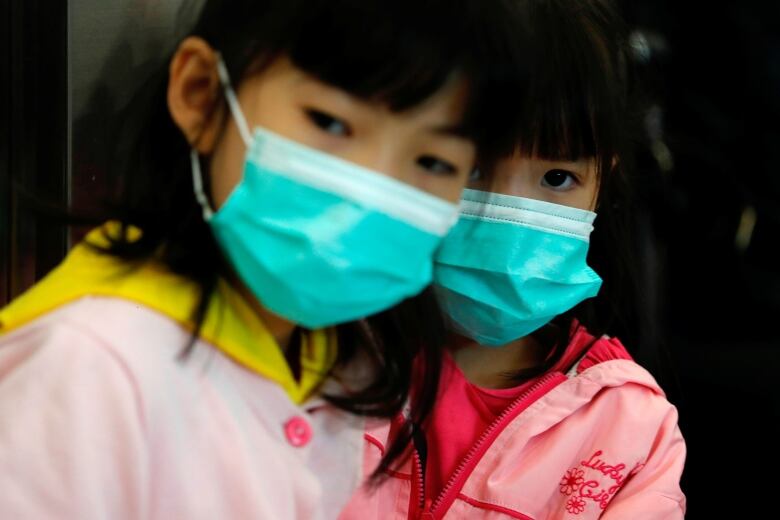Masks and COVID-19: When, how and why you'd wear them
Why do so many Asians wear masks? Are N95 or medical masks better? Should everyone wear one?

Public health officials inNorth America initially discouragedhealthy people from wearing masks, saying there's no evidence they provide effective protection against the spread of the coronavirus, which causes COVID-19.
But recently, some, including those in Canada and the U.S.,have saidthat wearing non-medical masks in tandem with physical distancing measures couldlimit the transmission of the virus.
In areas where COVID-19 activityis present, in addition to handwashing and cough etiquette, "use of non-medical masks or face coverings is recommended as an added layer of protection when physical distancing is difficult to maintain," said Theresa Tam, Canada's chief public health officer, on May 20.
Officials in some Asiancountries have encouraged mask use since the early days of the pandemic.
Additionally, health workers in the U.S. and Canada say they need masks for protection and are struggling with shortages.
Here's a closer look at what public health officials and the research says about who should wear a mask, how to wear one properlyand what kind of protection it offers.
WATCH | Dr. Theresa Tam explains her latest recommendation on mask use:
What are the different kinds of masks,and what protection do they offer?
There are three main types of masks that are available:
- N95: These are tight-fittingmasks that are designed to seal around the nose and mouth and screen out 95 per cent of small airborne particles. They're likely to prevent transmission of aerosolized virus those suspended as a mist in the air. Because of that, they're used by health-care workers in specific medical procedures that generate aerosols, such as inserting a breathing tube or bronchoscopy (imaging someone's lungs and air passages), saidDr. Mark Loeb, a professor of pathology and clinical epidemiology at McMaster University in Hamilton. There is a variation of the N95 mask that has an exhalation valve, which makes it easier to breathebut allows unfiltered air to escape. Health Canada recommends against the use of this type of mask as a COVID-19 prevention measure.
- Surgical or medical masks: These are looser fitting, more flexibledisposable masks that are considered effective barriers against large droplets released by talking, coughing or sneezing the main way COVID-19 is likely transmitted.
- Non-medical cloth masks: You may have seen volunteers sewing these reusable, washable masks for distribution, and some hospitals in the United Stateswere even asking for themas a last resort because of shortages of other kinds of masks. At least one Toronto hospital has requested such masks for people who don't work in health care, such as hospital visitors or recently discharged patients. However, Gardam notes they're quite porous and their effectiveness hasn't been studied much.
WATCH |Dr. Samir Gupta explains what you should consider before putting on a mask against COVID-19:
Whichmask is recommended for health-care workers?
For everyday medical care, recommendations vary, saidLoeb. For example, the U.S. national Centersfor Disease Control and Prevention recommends the use of N95 masks, but the Public Health Agency of Canada recommends a medical mask, and Ontario previously recommended N95 and is now recommending medical masks.

However, Loeb saidN95masksare definitely needed for special medical procedures that generate aerosols.
The World Health Organization says cloth masks are not recommended for health-care workers "under any circumstances."
How effectively do masks protect health-care workers?
Consistent use of either N95 or surgical masks reduced infection with SARS, another coronavirus, by roughly 80 per cent among health-care workers, saidLoeb, based on both his own research and a study by another research group.
Both the SARS studies and a more recent study on a variety of respiratory illnesses, including coronaviruses, didn't find a big difference in protection between the two kinds of masks for regular medical procedures. Loeb is currently setting up a randomized control trial to confirm whether there is a difference for COVID-19.
However, Dr. Michael Gardam, chief of staff at Toronto's Humber River Hospital, noted that masks are never used alone as personal protective equipment by health-care workers they go with face shields, gowns and gloves.
The one randomized clinical trialof cloth masks in a health-care setting for protection against respiratory illness done on influenza, not COVID-19 found that they let through 97 per cent ofvirusparticles and actually increased the rate of infection among health-care workers. That same study found surgical masks failed to block 44 per cent of virus particles.
The authors of that 2015 studyrecently wrote an addendum to their research because they have received so many questions about it since the coronavirus pandemic began.
When are masks recommended for members of the public?
N95 masks are not generally recommended for the public in North America for protection against disease.
But the World Health Organization (WHO) recommends wearing a medical mask at home, if you:
- Have symptoms, like coughing or sneezing, as it can reduce contagious droplets from being sprayed around you.
- Are caring for someone with a suspected COVID-19 infection.

Outside these circumstances, the WHO saysmedical masks should be reserved for health care workers.
Although initially public health officials in North America and Europe said healthy people didn't need to wear masks in public andpeople with respiratory symptomsshouldn't be leaving their homesat all, more recently, they have said that non-medical masks can be an additional measure to protect those physically close to you by reducing the chances of some of your respiratory droplets coming into contact with them.
On April 3, the U.S. Centers for Disease Control and Prevention began torecommend wearing cloth face coverings in public placeswhereother physical distancing measures are hard to maintain (such as grocery stores and pharmacies), especiallyin areas with community-based transmission.
On April 6, Tamalso suggested using non-medical masks when out grocery shopping or at a pharmacy.
However, she said the mask protects people around the mask wearer,not necessarily the person wearing it.
That same day, the World Health Organization saidthere is no current evidence to make a recommendation for or against the use of such masks by the general public but it encourages countries that recommend this kind of mask usage to conduct research on the topic.
WATCH | Can cloth masks protect you from COVID-19? Two doctors weigh in:
What's the proper way to use a mask?
WHO recommends:
-
Before putting on a mask, clean your hands with soap and water or alcohol-based hand sanitizer.
-
Cover your mouth and nose with the mask and make sure there are no gaps between your face and the mask.
-
Avoid touching the mask while using it and clean your hands if you do.
-
Replacethe mask with a new one as soon as it's damp and don't reuse single-use masks.
-
Remove it from behind, discard immediately into a closed binand then clean your hands with soap and water or alcohol-based hand sanitizer.
WATCH | WHO guidance onthe correct way to wear a mask:
How effective are masks at protecting you against respiratory infections such as COVID-19?
We don't know specifically for COVID-19, but studies of families where someone has the flu show mask usage is not that effective at preventing transmission, saidGardam, an infectious disease physician.
"It's not at all the dramatic reduction that you would want."
That's probably because the masks have to be used properly and consistently all the time, he said.

On the other hand,"it's not going to hurt. It might help," he said.
But he noted frequent handwashing and keeping at least two metres away from other people are probably more effective and still need to be used in conjunction with a mask.
Why shouldn't healthy people wear N95 or medicalmasks while in public?
The World Health Organization lists fourreasons, saying the masksmay:
- Create a false sense of security and cause people to be less vigilant about hand-washing and physical distancing.
- Lead to people touching their face under the mask or under the eyes (to adjust the mask or scratch itches).
- Generate unnecessary costs.
- Take masks away from those in health care who need them most, especially where there are shortages.
The latter is a big concern for Loeb.
"People are walking down the street with these masks," he said, "And I think that's a waste."
Ordinary people should be physical distancing so they're never in a position where they might be exposed to a cough or sneeze from someone with COVID-19, he said.
Meanwhile, health-care professionals, who certainly will be exposed, are running out: "There's a very limited supply that's getting more limited."

In a follow-up interview on April 7, Gardamagreed, but said he is also concerned that people may mistakenly think masks in general protect the wearer rather than others, and get a false sense of security.
"I just worry that it might unintentionally encourage them to get out more, and I don't really want to do that," he said.
Anecdotally, he said, he's noticed that people wearing masks seem less likely to move over and engage in proper physical distancing when encountering others.
There also is limited evidence that healthy people wearing masks reduces the community spread of diseases, like COVID-19, as public health officials have been saying, but some acknowledge that's partly because studies haven't been done.

Are there exceptions where healthy people should wear masks in public?
Maybe. In a recent article in the Lancet, researchers led by Elaine Shuo Feng, a postdoctoral researcher with the University of Oxford Vaccine Group, suggestedit would be "rational" to recommend wearing face masks in public for:
- Healthy people in quarantine (or self-isolation) if they need to leave home for any reason.
- Vulnerable people, such as older adults, and those with underlying medical conditions.
Gardam saidwhile wearing a mask makes "zero sense" while walking down the street, there is a logic to using one if you're forced to be in an enclosed space, such as public transit or a crowded grocery store (although many grocery stores are now limiting the number of customers inside) circumstances where non-medical masks are now recommended by both Canada and the U.S.

Why is there so much more mask-wearing in Asia and among Asian people?
In Asian countries, there are circumstances where mask-wearing is recommended or required, according to Feng's paper, which looked into the variation.
For example, in China, as part of strategies to reduce the transmission ofCOVID-19, some provinces and municipalities make face masks compulsory in public areas, and it's recommended while shopping or in gatherings of children and students.
Hong Kong specifically recommends masks when taking in publictransit or staying in crowded places.
The researchers also said that for cultural reasons, masks are considered a hygienic practice even for healthy people in Asia, while in North America it's considered something only sick people do.

Are there possible advantages to everyone wearing masks?
Feng's study suggestedtwo possible advantages:
- It might reduce community transmission, since there's evidence COVID-19 can be transmitted before symptoms begin.
- It could reduce discrimination and racial aggression against people who wear masks.
Some people have argued that universal mask-wearing is one of the "pillars of success" behind successful action to curb COVID-19 transmission in China, Japan, Singapore and South Korea.
Gardam saidhe thinks that's a false argument, because those countries took many measures, and it's impossible to say whether or how much of a difference universal mask-wearing made.

For now, what's the take-home message on masks?
Hopefully, wearing non-medicalmasks will help protect other people, Loeb said in a follow-up interview on April 7.
"But it should not be done at the expense of physical distancing."
Gardam agreed, saying it's still scientifically debatable whether mask-wearing by the public helps curb the spread of COVID-19.
"The one strategy where there's actually no debate is physical distancing," he said.
He also wants to make sure people understand that if masks offer protection, it's for people around the mask wearer, not the person wearing the mask.
"So, by all means, wear your masks just know why you're wearing them and don't stop the other stuff you're doing."
WATCH | How to properly wash your hands:

















_(720p).jpg)


 OFFICIAL HD MUSIC VIDEO.jpg)
.jpg)



























































































